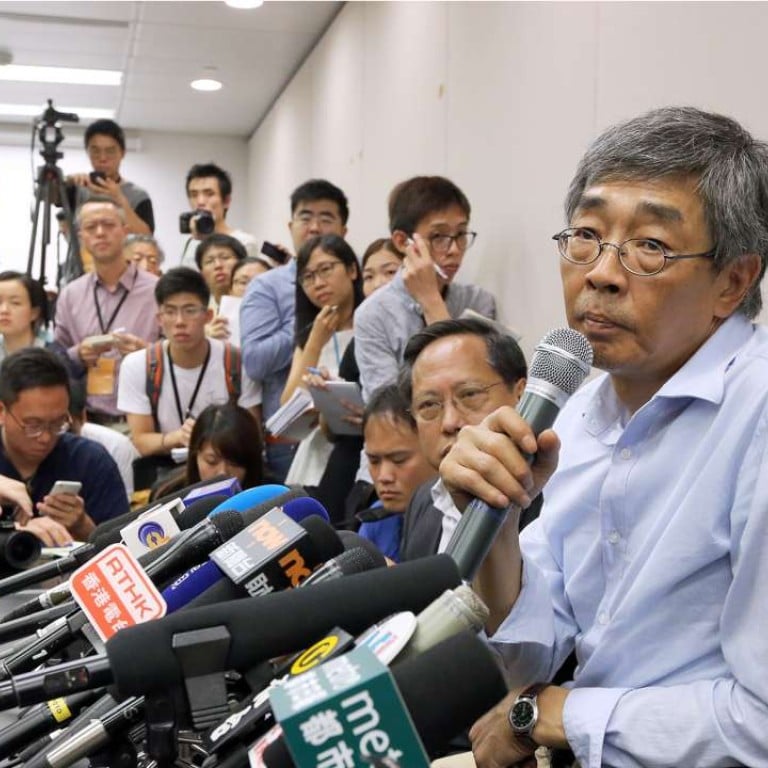
Analysis | Special task force identified by HK bookseller usually targets only top officials, analysts say
The central investigators that Lam Wing-kee claims held him incommunicado over the border are rarely mentioned in official media, but have been linked to many of the largest probes in recent years
Beijing’s alleged use of a special task force to pursue five Hong Kong booksellers who published works critical of top officials points to the leadership’s sensitivity to possibly damaging gossip, analysts said.
Such teams were usually established only in cases involving very senior politicians, and requires the approval of top Communist Party leaders, they said. The task force’s involvement suggested the investigations were ultimately about factional politics and a perceived challenge to the top leadership’s authority.
Hong Kong bookseller Lam Wing-kee told reporters on Thursday he believed the people who detained him at the Chinese mainland border reported directly to party headquarters.
“They do not represent the state security agency, not the police, not the military, but rather a central special investigation task force,” Lam said.
His account, if true, would mean that the investigators were authorised with exceptional power – and could be exempted from certain legal requirements, said Beijing-based political commentator Zhang Lifan.
The teams are very rarely mentioned in official media, which adds to their secrecy. They are ad-hoc groups of investigators who report directly to party headquarters, and do not belong to any official law enforcement body, although their members include police officers.
In recent years, such teams have been formed to go after top politicians suspected of graft.
The investigations into disgraced former security tsar Zhou Yongkang and another former member of the Politburo, ex-Chongqing party boss Bo Xilai, were both reportedly handled by members of special investigation groups, long before the cases were passed to prosecutors.
Former minister of supervision Ma Wen acknowledged to China Newsweek last year that a central investigation task force was involved in Bo’s case but denied she was the team’s chief.
It’s unheard of that a central special investigation group is set up against ordinary people
Zhang said: “It’s unheard of that a central special investigation group is set up against ordinary people. They might consider them linked to overseas subversive forces or internal rival factions. The search for information about both writers and readers of their books shows the severe anxiety of the leadership.
“They believe such publications have greatly tarnished the image of the party, which they tried so hard to build over the past three years,” Zhang said.
After President Xi Jinping’s administration launched a massive crackdown against graft in 2013, some disgraced top politicians, including Zhou and former presidential aide Ling Jihua, have been accused of forming political cliques and engaging in activities not aligned with party headquarters.
Zhang’s remarks were echoed by Lin Baohua, a Taipei-based historian specialising in the Communist Party, who also goes by the name Ling Feng.
The central special investigation team is using them to find out which political clique is behind the publisher
“The central special investigation team is certainly not targeting ordinary people like Lam [and other booksellers], but using them to find out which political clique is behind the publisher of so many books undermining the party’s leaders,” Ling said.
The leadership apparently believes the clique uses publications outside the mainland “to challenge the authority and administration of the party leadership”, Ling said.
Such special investigation groups were common during the Cultural Revolution – a decade-long period of political and social turmoil, which started in 1966.
Targets were usually senior cadres who have in hindsight been considered victims of political struggles.
The investigation of former president Liu Shaoqi was handled by members of an ad-hoc investigation group that reported directly to the top leadership of the party. Liu died while in custody in 1969.
Fourteen such groups were set up between 1967 and 1971, according to the memoir of Wu Faxian, a former Politburo member, who was jailed in 1971.

